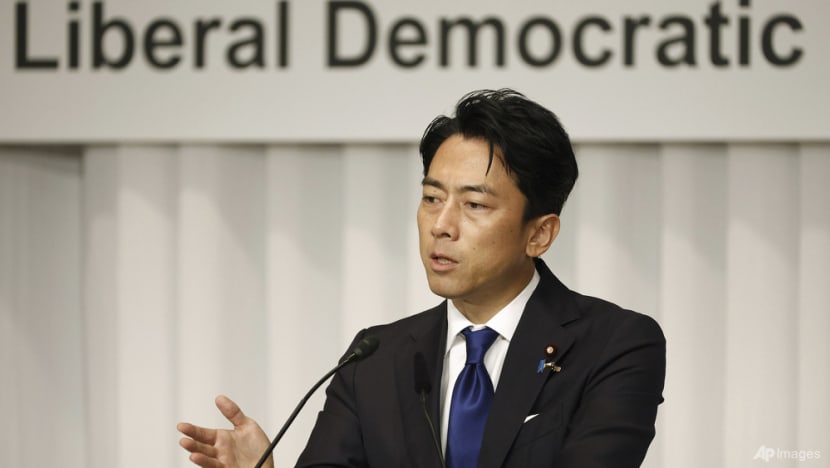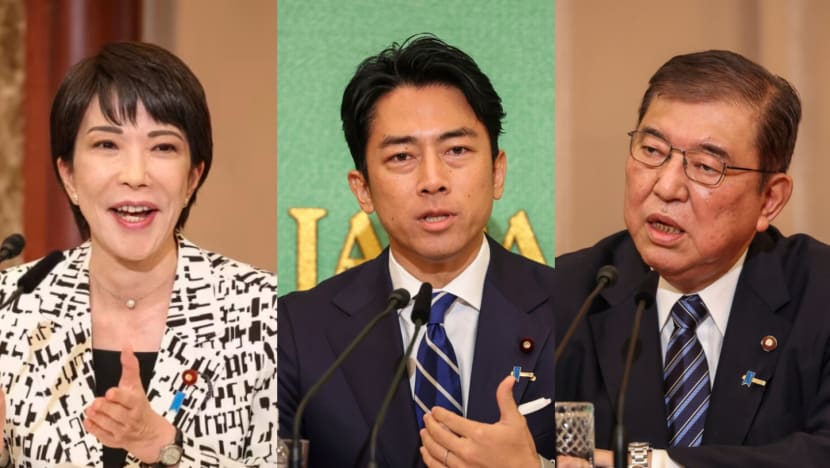Does Shinjiro Koizumi have what it takes to become Japan's youngest prime minister?
Among the nine candidates in the race to replace Prime Minister Fumio Kishida as party president and lead Japan is 43-year-old Shinjiro Koizumi.

Japan's former Environment Minister Shinjiro Koizumi, a candidate of Japan's ruling Liberal Democratic Party (LDP) presidential election, speaks during a joint news conference at the party's headquarters in Tokyo Friday, Sept. 13, 2024. (Franck Robichon/Pool Photo via AP)

This audio is generated by an AI tool.
TOKYO: Japan’s ruling Liberal Democratic Party (LDP) is set to pick a new leader on Friday (Sep 27).
A record nine candidates are in the race to replace Prime Minister Fumio Kishida as party president and leader of Asia’s second-largest economy.
Among the candidates in the running is 43-year-old Shinjiro Koizumi, a former environment minister who has been leading in media polls.
If Mr Koizumi wins, he will become the youngest prime minister in Japan. He became a national lawmaker in 2009 when he was just 28 years old.
He was elected to the lower house seat in Yokosuka, Kanagawa prefecture, which was vacated by his father, former prime minister Junichiro Koizumi, a popular leader when he was in office between 2001 and 2006.
SHINJIRO KOIZUMI’S RISE
In 2019, Mr Koizumi was appointed environment minister by the late former prime minister Shinzo Abe.
Mr Koizumi served for about two years in the role – the only Cabinet post that he has ever held.
He was also parliamentary vice-minister for reconstruction of the tsunami-hit Tohoku region in 2011.
Often rated in polls as the politician voters would most like to see as prime minister, Mr Koizumi’s star is rising in the party. He already has the backing of party heavyweight Yoshihide Suga, who is also a former prime minister.
Branding himself as a pragmatic reformist like his father, Mr Koizumi has pledged to immediately dissolve parliament for a snap election if he wins the LDP presidency.
“In order for the LDP to really undergo change, it needs a leader who would call for its reform,” he said during his election campaign in Tokyo's Ginza earlier this month.
He also vowed to be decisive in handling the political fund scandal that has plagued the party since last November.
Lawmakers from powerful factions have been accused of pocketing funds raised at political campaigns without declaring them.
“I will put an end to the lack of transparency between politics and funds,” he added during his campaigning in Ginza.
“Even funds for stationery items which did not have to be disclosed will be disclosed. Unused funds will have to be returned to the national treasury,” he added.
The allegations have led to the downfall of LDP heavyweights including Mr Kishida's Cabinet members.
Two factions within the party, including Kishida’s faction, were disbanded following the scandal, with a few others still in the process of being dissolved. Factions originally started with post-war prime ministers forming groups with those who shared their values.
Mr Koizumi does not belong to any faction, which has won him the support of those who want to see change.
He is also looking at introducing social reforms. Although Japan's big companies have traditionally followed lifetime employment, Mr Koizumi has flagged the employment practice as a hindrance in encouraging the Japanese to take on new challenges and joining smaller firms.
WAVERING SUPPORT FOR MR KOIZUMI
However, public support for Mr Koizumi began to slide after he gave various public comments that were seen as a reflection of his lack of experience.
This includes his statements surrounding the issue of Japanese abducted by North Korea. From the late 70s to early 80s, North Korean military and intelligence operatives kidnapped at least 17 Japanese citizens from Japan.
In 2002, the elder Koizumi brought home five of the abductees, but there has been no progress since.
During a joint debate with other contenders last week, the LDP presidential candidate said: "Once I become prime minister, I will be a leader of the same generation as Kim, which is important for resolving the longstanding abduction issue.” He was referring to North Korean leader Kim Jong Un.
"As leaders of the same generation, I want to explore new opportunities for dialogue. I aim to open up new possibilities that have not yet been realised through diplomacy led by leaders,” he added.
While his progressive image may cost him support from party old guards, analysts believe Mr Koizumi will garner votes from LDP members as his popularity may be able to save them from losing seats in the general election.
TIGHT THREE-WAY RACE
Mr Koizumi's closest competitors have emerged as former defence minister Shigeru Ishiba and Economic Security Minister Sanae Takaichi.
Mr Ishiba is hoping the fifth time's the charm, while Ms Takaichi is making her second attempt to become the nation's first female prime minister.
Mr Ishiba, a banker-turned-politician, the 67-year-old was elected to the lower house of parliament in 1986. He has held various Cabinet posts and was minister of defence in the Yasuo Fukuda government between 2007 and 2008.

The former LDP secretary general first threw his hat into the party leadership race in 2008. At the time, he received the least number of votes in a five-horse race that saw former prime minister Taro Aso emerge the winner. In 2012, he lost in another five-way battle.
Mr Ishiba, who, like Mr Koizumi, does not belong to any faction, is consistently ranked among the top favourites for LDP president.
Ms Takaichi, 63, is known for her fierce loyalty to the hawkish policy of Mr Abe when he was in power. In return, the late former prime minister threw his weight behind her last presidential bid, making her the new face of the right wing of the party.
Recent polls have showed Ms Takaichi gaining among rank-and-file members of the party.

















